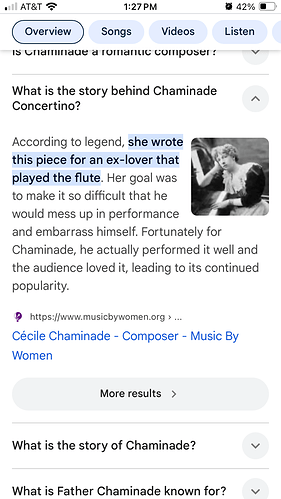If you’re in a hurry, start at about 0:50, and it looks brutal to play:
OMG, the flute people can also beatbox?! An hour ago I had no idea how awesome flute was, but now I realize.
Cool stuff! I particularly liked :49 - 1:09, the scale runs were very dramatic-sounding leading into the modulations.
Knight Rider at 1:30?
Flute apparently has a concept of “extended technique,” where this is the “new” stuff, and here is a demo! I would have thought that flute was a mature instrument, but it does have some new techniques creeping in.
All I can say if somebody tries to beatbox without a flute they’re nothing in my book.
I’ve seen this phrase thrown around on a lot of instruments, including guitar. It really just means “atypical”.
Yeah I’m sure that the “extended techniques” are fringe/atypical, but did the ancients use them? My guess is “no,” particularly for the beat-box stuff.
Apparently this guy was considered to be the “best” beatboxer in the world. He’s obviously incredible (like Beatbox Bigman!), but, if he had a flute as well… 
Was it Mozart who composed stuff with wild soprano range because the one soprano would mover her neck when singing difficult stuff?
Don’t piss off artists.
@kgk
A lot of woodwinds have this concept of “extended range” (the strings have it too there are some parts in Shostakovich and other modern composers string pieces that are infamously murder for celloists playing super high up on the fingerboard out of the normal range). Probably the most famous extended range part is the bassoon intro to Stravinsky’s “Rite of Spring” very high in the instrument’s register.
Pretty much all the shred techniques, tapping, sweeping, etc could be seen as the “extended range” of the electric guitar. In the classical world it’s usually associated especially with stuff far outside the normal playing range or the weird sound effects and such in a piece like Penderecki’s “Threnody for the Victims of Hiroshima” or other modern pieces with graphical scores.
One of the reasons the atonal or 12 tone composers rarely get played is that stuff like Webern is really freaking difficult to play.
Going back to guitar I guess Tom Morello is like the king of this idea. See the intro to songs like “Cochise” by Audioslave or “Revolver” by Rage Against the Machine or the solo of Audioslave’s “Bring Em Back Alive”
Watching Tom do these kind of antics live at various times in a Springsteen set on the High Hopes tour was wild.
Always been inspired to this kinda stuff and it’s probably why the DigiTech whammy was the second effect I ever bought.
Yeah, I mean I typically think of it is as prepared piano, stuff like that. This is a good example with a lot of direct plucking/strumming of piano strings. Super beautiful starting around the 4 minute mark, imo.
Got a light?
Susan Alcorn is a name to know she conjurs some wildly out of the box sounds from the pedal steel guitar. (And gets no shortage of hassle from country purists for it)
I like the Alcorn stuff! I’ll look into her further.
I never went too far down the experimental road, but here’s a piece I quickly created using prepared guitar and a faulty cable a dozen years back…
Re the original post: That’s cool. I think for those that have good legato technique worked out it’s not that crazy. Definitely like, “pro level” musicianship there, but without doing a deep dive it does seem playable. It helps that it’s more of a legato sound, and the direction of the notes is not changing that frequently.















